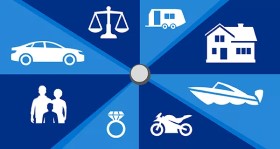What Is Umbrella Insurance? How Does It Work?
Umbrella insurance is a supplemental insurance that supplements the limits and coverage of other policies. Accidents, property damage, lawsuits and personal liability can all be covered under one blanket policy.
What is Roof Insurance?
Protecting your future and your assets can be made easier with umbrella insurance in two ways:
An umbrella policy can extend coverage beyond your home, vehicle and boat policies.
Umbrella insurance covers false arrests, defamation, defamation and other tort claims, as well as liability insurance for rental properties you own.

What does umbrella insurance cover?
If your liability insurance doesn't cover all your losses, you may need an umbrella policy. The umbrella policy provides liability protection when:
• Injuried
• damage
• certain claims
• Personal responsibility
Who can benefit from the umbrella policy?
Part of your mind thinks, "I covered my car and my home." That's right! Then there's umbrella insurance, which extends your coverage beyond the limitations of your existing plan and covers situations not covered by other policies.

Examples of coverage for an umbrella policy:
Liability for personal injury also extends to those injured as a result of an accident. For example, medical expenses and liability claims for injuries caused by:
• You caused a terrible car accident.
• Injury to others by your pet
• A guest slips and falls.
• A neighbor's child slips in your yard.
A person's liability for property damage includes the cost of repairing or replacing damaged or missing tangible items. An example is damage to cars and other property caused by an accident through your fault.
You may be held responsible for the actions of others who live in your rental home. For example, liability claim costs may include:
• Someone stumbles on the cracked sidewalk of your rental property and injures himself and files a lawsuit against you.
• You may be held liable if your tenant's dog attacks and injures someone.
It also covers you if another party sues you for:
• Defamation: A defamatory statement in the form of a verbal attack.
• Defamation: A defamatory written statement.
• False imprisonment, imprisonment or imprisonment.
• Malicious law enforcement
• Shock/Strain
An umbrella case doesn't cover everything, so what's excluded?
The following items are not normally covered under a blanket policy:
• Injury and damage to your own property
• Intentional or illegal actions that harm others.
• Contractual Liability
What protection can you get from an umbrella policy?
To further illustrate how umbrella insurance can protect you, let's look at a specific case. If you caused an accident that caused $600,000 in damages to others, you did not follow the rules. You also have $400,000 worth of personal injury coverage on your auto insurance policy. Your auto insurance will cover the $400,000 in damages, but it will cover the remaining $200,000 in medical expenses.
If you have an umbrella cover, you are covered. If your auto insurance's maximum deductible is exceeded, you will receive the maximum deductible of your maximum deductible umbrella policy.
How much does an umbrella policy cost?
The cost of umbrella coverage depends in part on the level of protection you get. Insurance rates for an umbrella policy may vary based on your geographic area, vehicle collection, the number of homes you own, and other factors.
Related Articles
- The essential functions of an insurance company
- The Advantages And Disadvantages Of Purchasing Permanent Life Insurance
- The Benefits and Risks of Life Insurance. Do you need one.
- 2022’s Top Car Insurance Companies
- Reasons Why Your Homeowner's Insurance Might Get Cancelled
- Why Your Car Insurance Claim Might Not Be Accepted
- The insurance industry. Growing and Declining Sectors
- The Essential Insurance Covers Everyone Should Have
- How to get lower health insurance premiums
- Challenges Facing the Insurance Industry Today
Reading Rankings
- Insurance role in addressing climate change and sustainable development
- Factors affecting travel insurance costs
- Reasons why your homeowners insurance may be cancelled
- Lapses: An Overview
- Reasons Why You Might Need To File A Travel Insurance Claim
- Factors Affecting Cost Of Travel Insurance
- Mistakes you may make when applying for homeowners insurance
- Reasons Why Your Homeowner's Insurance Might Get Cancelled
recommended
![]()
The different types of health insurance plans you should know about
![]()
What to Look For When Selecting an Insurance Provider
![]()
Get homeowners insurance for bad roofs
![]()
Reasons Why Your Homeowner's Insurance Might Get Cancelled
![]()
What Is The Role Of A Home Insurance Broker?
![]()
The Top 5 Life Insurance Mistakes That People Make
![]()
The Insurance Industry’s Trends
You might like
- Top 5 life insurance mistakes people make
- Mistakes You Can Make When Claiming Your Homeowner's Insurance
- What Is Insurance Proof?
- The essential functions of an insurance company
- Which Is Better - Term Life Insurance Or Permanent Life Insurance
- The different types of health insurance plans you should know about
- What consumer benefits does life insurance offer?
- How To Make A Claim For Your Stolen Car







